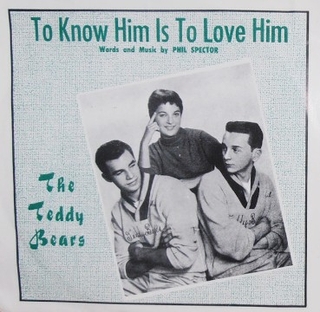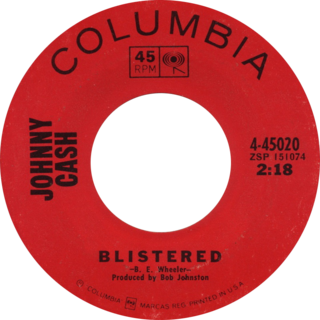Related Research Articles
"Always on My Mind" is a ballad written by Wayne Carson, Johnny Christopher, and Mark James, first recorded by Brenda Lee, and first released by Gwen McCrae in March 1972. Lee's version was released three months later in June 1972. The song has been a crossover hit, charting in both the country and western and pop categories. Elvis Presley's recording was the first commercially successful version of the song.

"Chantilly Lace" is a 1958 rock and roll song by The Big Bopper. It was produced by Jerry Kennedy, and reached No. 6 on the US Billboard Hot 100. The song was also covered by Jerry Lee Lewis in 1972.
"Sunday Mornin' Comin' Down" is a song written by Kris Kristofferson that was recorded in 1969 by Ray Stevens before becoming a No.1 hit on the Billboard US Country chart for Johnny Cash.

"I Can See Clearly Now" is a song written and recorded by American singer-songwriter Johnny Nash. It was the lead single from his album, I Can See Clearly Now (1972), and achieved success in the United States and the United Kingdom when it was released in 1972, reaching number one on the US Billboard Hot 100 and Cash Box charts. It also reached number one in Canada and South Africa. The song has been covered by many artists throughout the years, including a hit version by Lee Towers that reached no. 19 in the Dutch Top 40 in 1982, and another recorded by Jimmy Cliff for the motion picture soundtrack of Cool Runnings that peaked at no. 18 on the US Billboard Hot 100 in 1993.
"If I Were a Carpenter" is a folk song written by Tim Hardin in the 1960s, and re-recorded with commercial success by various artists including Bobby Darin, The Four Tops and Johnny Cash. Hardin's own recording of the piece appeared on his 1967 album Tim Hardin 2. It was one of two songs from that release performed by Hardin at Woodstock in 1969. The song, believed by some to be about male romantic insecurity, is rumored to have been inspired by his love for actress Susan Morss, as well as the construction of Hardin's recording studio.

"To Know Him Is to Love Him" is a song written by Phil Spector, inspired by words on his father's tombstone, "To Know Him Was to Love Him." It was first recorded by the only vocal group of which he was a member, the Teddy Bears. Their recording spent three weeks at No. 1 on the Billboard Hot 100 chart in 1958, while reaching No. 2 on the UK's New Musical Express chart. Peter & Gordon and Bobby Vinton later had hits with the song, with its title and lyrics changed to "To Know You Is to Love You". In 1987, the song was resurrected by Dolly Parton, Linda Ronstadt, and Emmylou Harris, whose Trio recording topped the U.S. country singles chart. The song is in 12/8 time.

"Da Doo Ron Ron" is a song written by Jeff Barry, Ellie Greenwich and Phil Spector. It first became a popular top five hit single for the American girl group the Crystals in 1963. American teen idol Shaun Cassidy recorded the song in 1977 and his version hit number one on the Billboard Hot 100 chart. There have also been many other cover versions of this song, including one by the songwriters Jeff Barry and Ellie Greenwich themselves, performing as the Raindrops.

"She's All I Got" is a song written by Gary U.S. Bonds and Jerry Williams Jr. It has been recorded by several artists. The first version, released in 1971 by Freddie North, was a Top 40 U.S. pop hit, and a version by Johnny Paycheck was a number 2 U.S. country hit that same year. A second country music version was released on Conway Twitty's 1972 Decca LP I Can't See Me Without You. There was also a version titled "He's All I Got" that was on Tanya Tucker's 1972 album Delta Dawn. Yet another cover titled "Don't Take Her She's All I've Got" was released by Tracy Byrd, whose version reached number 4 on the U.S. and Canadian country singles charts. Co-author Jerry Williams Jr., aka Swamp Dogg, released his own version on his 2020 album Sorry You Couldn’t Make It.
"A Thing Called Love" is a song written and originally recorded by Jerry Reed in 1968. This song has been recorded by many artists, including Jimmy Dean, Elvis Presley, Glen Campbell and Dave Dudley. In 1971, the song was recorded by Johnny Cash and it became a No. 1 country hit in Canada. The record was Cash's biggest hit in Europe, charting in Ireland, the United Kingdom, and the Netherlands.

"Do I Love You" is a song co-written and recorded by Paul Anka, from his 1972 eponymous LP. Released as an advance single in late 1971, "Do I Love You" reached number 14 on the Easy Listening Singles charts of both the U.S. and Canada, number 16 on the Canadian Pop chart, and was a modest hit on the U.S. Hot 100 as well. As with the earlier "My Way", it was adapted from a French-language song popularized by Claude François, and Anka composed the English lyrics.

"Can't You See" is a song written by Toy Caldwell of The Marshall Tucker Band. The song was originally recorded by the band on their 1973 debut album, The Marshall Tucker Band, and released as the album's first single. Record World called it "a strong rhythm item that continually builds and builds." It was re-released in 1977 and peaked at number 75 on the Billboard Hot 100. Cover versions of "Can't You See" have charted for Waylon Jennings and the Zac Brown Band with Kid Rock (2010).
"Any Old Wind That Blows" is a song recorded by American country music artist Johnny Cash. It was released in November 1972 as the third single from his album Any Old Wind That Blows. The song peaked at number 3 on the Billboard Hot Country Singles chart. It also reached number 1 on the RPM Country Tracks chart in Canada. The song was written by Deena Kaye Rose.
"Oney" is a song recorded by American country music artist Johnny Cash. It was released in July 1972 as the second single from his album Any Old Wind That Blows. The song peaked at number 2 on the Billboard Hot Country Singles chart. It also reached number 1 on the RPM Country Tracks chart in Canada. The song was written by Jerry Chesnut.
"Cotton Jenny" is a song written and recorded by Gordon Lightfoot for his 1971 album Summer Side of Life. The song was later released as a single by Canadian country-pop artist Anne Murray.
"What Is Truth" is a song written and recorded by American country music artist Johnny Cash released in February 1970.

"Blistered" is a song recorded by American country music artist Johnny Cash. It was released in October 1969 as the first single from his album Hello, I'm Johnny Cash. The song peaked at #4 on the Billboard Hot Country Singles chart. It also reached #1 on the RPM Country Tracks chart in Canada. The song was written by Billy Ed Wheeler.

The Johnny Cash discography chronicles the output of American singer Johnny Cash. His lengthy career, spanning 1954 to 2003, saw the release of 91 albums and 170 singles on several record labels. Over the years, Cash also collaborated with many of the industry's most notable artists.

The following is a detailed discography of all singles released by American country music singer Waylon Jennings. A total of 16 Jennings' singles have reached number one on music charts.
"With Pen in Hand" is a song written by Bobby Goldsboro and first released on his March 1968 album, Honey. The song's lyrics address the subjects of divorce and losing custody of one's child, and are sung from the perspective of the parent who expects to be losing custody of their child, as they make a final plea to their spouse to reconcile before the divorce is finalized. "With Pen in Hand" has been a hit for multiple artists in the late 1960 and 1970s.
"He Understands Me" is a song released in 1963 by Teresa Brewer. The song was a hit single for Johnny Tillotson in 1964, retitled "She Understands Me", and Bobby Vinton in 1966, retitled "Dum-De-Da".
References
- ↑ "Johnny Cash singles". Allmusic . Retrieved 18 March 2011.
- ↑ "RPM Country Singles for June 24, 1972". RPM . Retrieved 18 March 2011.
- ↑ "Johnny Cash Chart History (Hot Country Songs)". Billboard.
- ↑ "Johnny Cash Chart History (Hot 100)". Billboard.